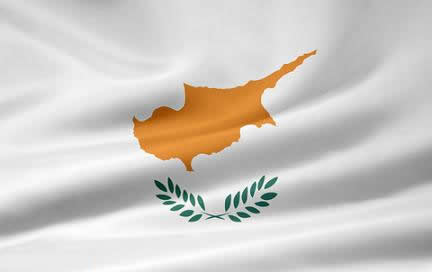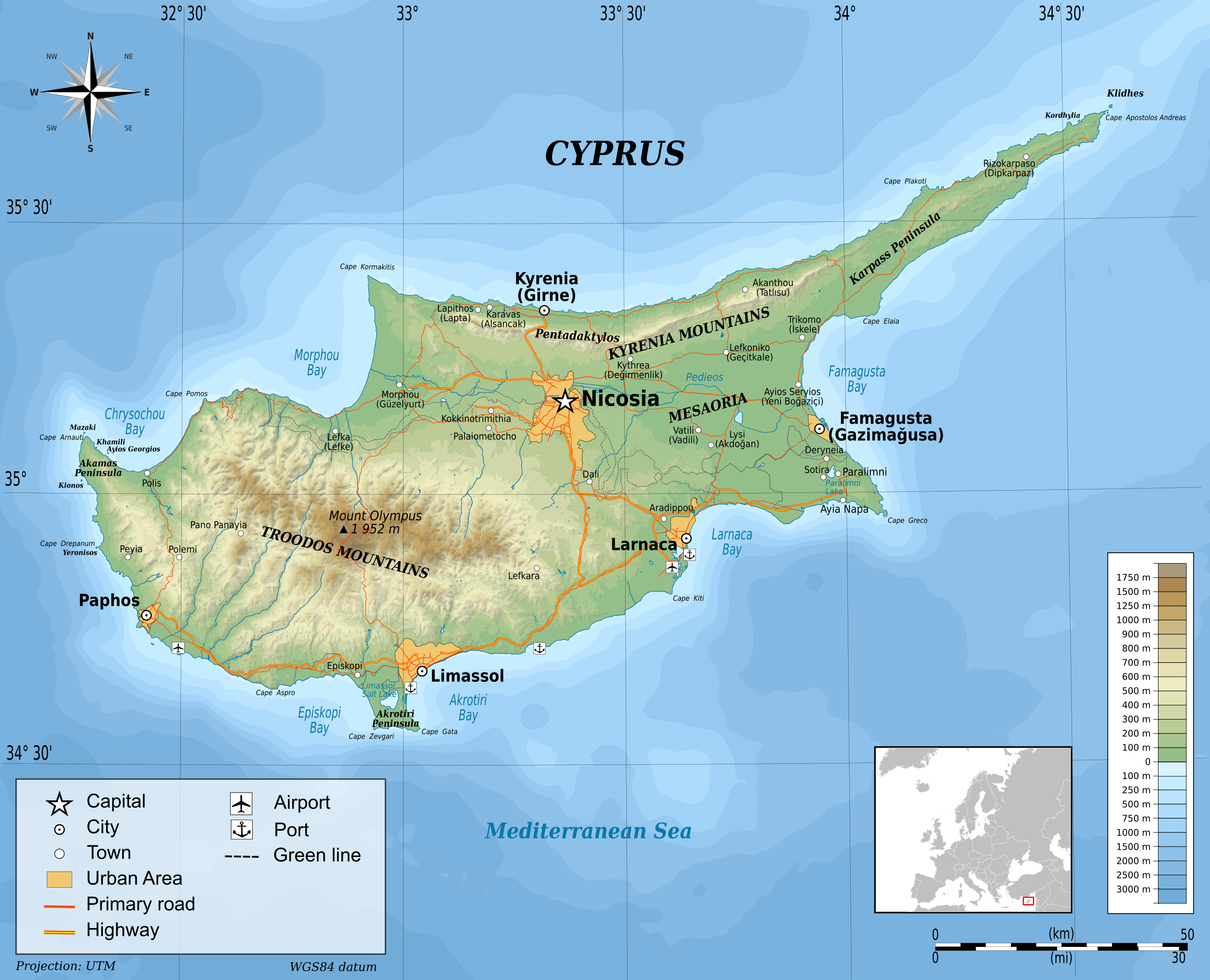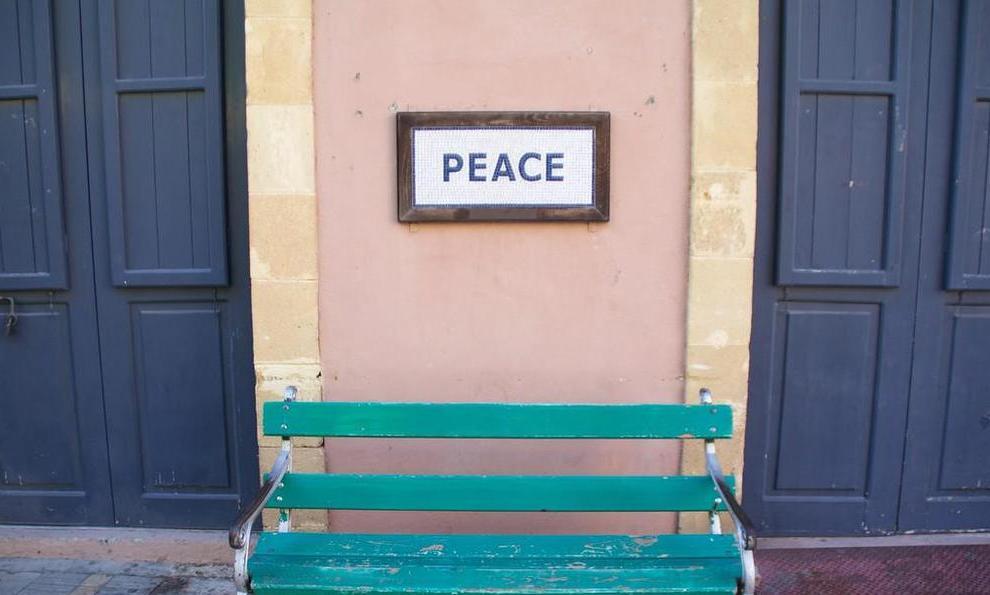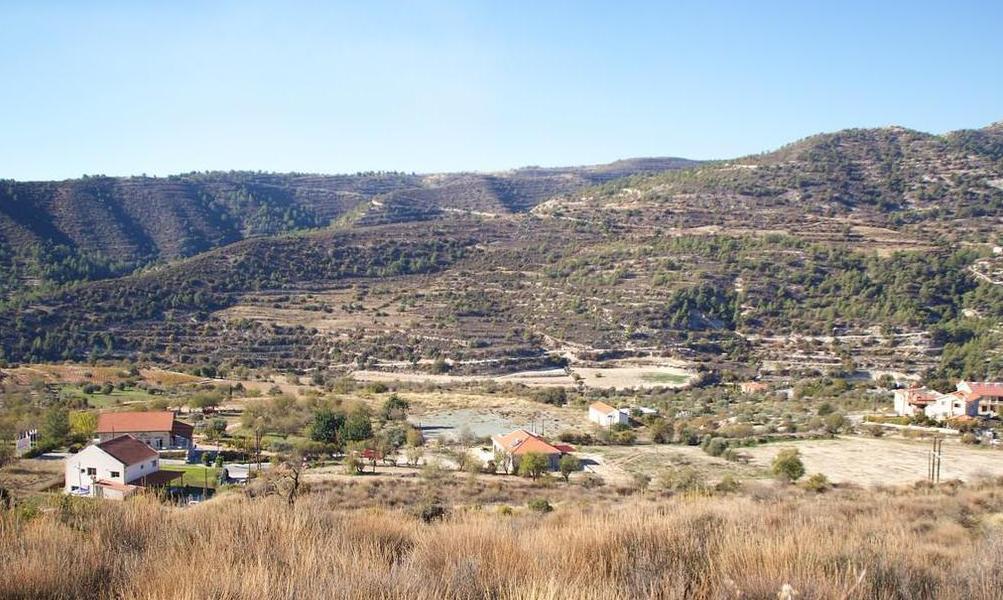Independence of Cyprus
On June 4, 1878, Britain concluded a treaty with the Ottoman sultan Abdul Hamid II, officially known as a Convention of Defensive Alliance. In this treaty Abdul Hamid agreed to the loan of Cyprus to Britain, while retaining Ottoman sovereignty over the island and the right to collect a tax known as the tribute.
Britain won de facto control of the island and the right to make laws and international agreements in the name of Cyprus. Within weeks of the signing of this treaty, the Union Jack flag was hoisted over Nicosia, and shortly afterward a contingent of Indian army troops arrived from Malta to safeguard British colonial rule, which lasted 82 years. For Britain, Cyprus became a vital staging area for its Middle East interests.
The island was formally taken over by the British in 1914, when the Ottoman Empire aligned itself with Germany and the other Central Powers during World War I. Under the Treaty of Lausanne of 1923, Turkey and Greece agreed that Cyprus would remain under British sovereignty, and in 1925 Cyprus was declared a crown colony.
Both the Greeks and the Turks of Cyprus considered British control a welcome relief from Turkish taxation; many Greek Cypriots also felt that the departure of the Ottoman administration brought the island closer to the Greek dream of enosis, or union, with Greece.
Thus, in effect, began the efforts of the Greek Cypriots to link the island’s destiny with that of Greece. The British government continued to state formally that no change in the status of the island was contemplated. Such an attitude further embittered the Greek Cypriots, although it was of some comfort to the Turkish Cypriots.
On April 1, 1955, a secret organization calling itself the National Organization of Cypriot Fighters - known by its Greek initials as EOKA (Ethniki Organosis Kyprion Agoniston) - declared a struggle until death to free the island from British rule and to link it with the Greek mainland. The war for the future of Cyprus began as colonial empires were crumbling around the globe. The British felt there was no question of a union with Greece or of full independence for Cyprus.
Considering its commitments in the Middle East and its still important role on the southeastern flank of the North Atlantic Treaty Organization (NATO), Britain regarded Cyprus as a crucial military base on the traditional crossroads of big-power competition for influence in the eastern Mediterranean.
Turkish Cypriot reactions were predictable. The Turks felt that, if successful, the Greek struggle for enosis against British colonial rule meant that the Turkish speaking minority on the island would lose the protection of the British.
Fear of a Greek victory prompted the creation of a Turkish Cypriot counter organization known as VULCAN; the Turkish Cypriot minority also cooperated with the British police and military in tracking down suspected EOKA fighters.
To the slogan of enosis, Turkish Cypriots answered with their own solution, that of takism, or partition, of Cyprus. Georgios Grivas, who had previously served as a colonel in the Greek army, led the EOKA. Grivas arrived on the island from Greece in 1954 and set out to prepare what amounted to an well-organized uprising.
In Nicosia, early in 1955, rumors of landings of saboteurs, of infiltration by agents dispatched from Greece, and of organized resistance began sweeping the narrow streets, and soon Cyprus became an armed camp.
An estimated 28,000 British troops were deployed throughout the island, manning roadblocks, searching passersby, pursuing elusive terrorist suspects, and uncovering arms caches and hideouts in some of the most improbable places. Cyprus had become a dangerous weak spot in the NATO alliance.
What needed to be done was to work out a system of ethnic power-sharing that would satisfy Greece and Turkey, as both nations worked to protect their Cypriot ethnic compatriots as well as their own interests. Talks between the two countries continued throughout January 1959.
On February 5, Greek prime minister Constantine Karamanlis and Adnan Menderes of Turkey met in Zurich, where they prepared, after negotiations and consultation with the leaders of the two Cypriot communities, an outline for a solution to the Cyprus situation. With that document in hand, they traveled to London, where they were joined by Archbishop Mikhalis Khristodoulou Makarios III and Dr. Fazil Kuchuk, the political leader of the Turkish Cypriot community.
The new Cypriot constitution, based on the Zurich-London agreements, was issued in April 1960 and paved the way for the proclamation of the independent Republic of Cyprus. The president of the republic was a Greek Cypriot while the vice president was a Turkish Cypriot, both being elected by their representative communities. Both had veto powers over foreign affairs, defense, fiscal matters, and security.
Three Treaties
On the same day the constitution was finalized it was accompanied by three treaties: the Treaty of Guarantee, the Treaty of Alliance, and the Treaty of Establishment. The Treaty of Guarantee was signed by Turkey, Britain, Greece, and Cyprus. It stated that the four countries agreed not to undertake activity aimed at promoting, directly or indirectly, a union of Cyprus with any other state, or a partition of the island.
The Treaty of Alliance involved Cyprus, Greece, and Turkey. It established a tripartite headquarter on the island and permitted the two latter states to deploy, respectively, 950 and 650 persons in Cyprus to protect the island.
The Treaty of Establishment was signed between Britain and Cyprus and granted Britain sovereignty over a territory on the island’s southern coast for two military bases, Akrotiri and Dhekelia. The constitutional agreement was reached at the price of some 500 killed during the EOKA struggle with the British, but it also allowed Britain’s colonial disengagement from Cyprus.
The flag under which the two communities of Cyprus were to unite was displayed to the public on August 16, 1960. The Union Jack was replaced with a white flag bearing an orange map of Cyprus with small green branches underneath.
In modern times, Cyprus acceded to EU membership in 2004, but did so as a still divided island, as the Turkish prime minister yet refused to extend a formal recognition of the country, even going as far as to threaten to annex the northern part of the country if the Republic of Cyprus joined the EU.
New peace talks begin in 2005 between the Cypriots & the UN, who made a push for a new diplomatic solution to the islands division. However the talks broke down the next year after new parties hostile to reunification efforts came to power in the governing coalition, blocking further peace efforts.
Another attempt at negotiation resumed in 2008 after pro-reunification parties under Demetris Christofias won the election of that year, & with the support of the Turkish leadership & symbolic measures such as the reopening of the Ledra Street crossing between the Turkish and Greek areas of Nicosia reopened for first time since 1964, there was optimism for a permanent solution.
But talks were again interrupted the next year after new parliamentary elections – this time in the Turkish area of northern Cyprus, that have since left discussions in a downbeat & weakened position. Since this time, pro-unity & pro-independence factions have been engaged in see-saw victories that continue to delay peace efforts to reunify the island.
The chance for peace talks have seemed ever pessimistic since 2011, when Cyprus begun exploratory drilling for oil and gas off the coast. This prompted a diplomatic row with Turkey & talks have been made more difficult with frequent Turkish intervention in the diplomatic discussions ever since, with hardliners on both sides unwilling to concede any ground.






Este Post ha recibido un Upvote desde la cuenta del King: @dineroconopcion, El cual es un Grupo de Soporte mantenido por 5 personas mas que quieren ayudarte a llegar hacer un Top Autor En Steemit sin tener que invertir en Steem Power. Te Gustaria Ser Parte De Este Projecto?
This Post has been Upvote from the King's Account: @dineroconopcion, It's a Support Group by 5 other people that want to help you be a Top Steemit Author without having to invest into Steem Power. Would You Like To Be Part of this Project?
Sure would. Tell me more.
Congratulations @supertoughfish! You have completed some achievement on Steemit and have been rewarded with new badge(s) :
Click on any badge to view your own Board of Honor on SteemitBoard.
For more information about SteemitBoard, click here
If you no longer want to receive notifications, reply to this comment with the word
STOPCongratulations @supertoughfish! You have received a personal award!
Click on the badge to view your Board of Honor.
Do not miss the last post from @steemitboard!
Participate in the SteemitBoard World Cup Contest!
Collect World Cup badges and win free SBD
Support the Gold Sponsors of the contest: @good-karma and @lukestokes
Congratulations @supertoughfish! You received a personal award!
You can view your badges on your Steem Board and compare to others on the Steem Ranking
Do not miss the last post from @steemitboard:
Vote for @Steemitboard as a witness to get one more award and increased upvotes!